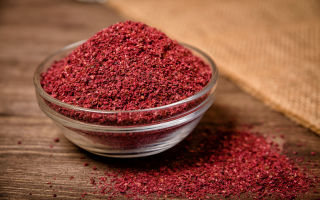Content
- 1 What it looks like and where it grows
- 2 Types of sumach
- 3 What is the composition of sumac seasoning made of?
- 4 The smell and taste of spice
- 5 Why is sumac useful?
- 6 The use of sumac seasoning in medicine
- 7 Application in cosmetology
- 8 Cooking applications
- 9 Contraindications and possible harm
- 10 How to choose and where to store
- 11 Conclusion
The beneficial properties of sumac are appreciated in cooking, pharmaceuticals and alternative medicine. Due to the sour taste of the fruit, it is also called the vinegar tree. Even in ancient Rome, they were used as an alternative to lemon juice and vinegar. However, the fruits of some varieties of sumach are inedible, so special care must be taken with it.
What it looks like and where it grows
Sumakh is a shrub belonging to the Anakardiev family. According to its external features, it resembles a mountain ash. The height of the tree can vary from 2 to 8 m. It has feathery leaves and small numerous flowers. The length of the leaves can reach 10 cm. Above, their surface is dark green, and below it is bluish. The bush inflorescences include 5 sepals.
Sumac can be grown independently only in the southern regions. It belongs to thermophilic trees, which is why it does not tolerate frosts. In addition, the plant needs constant watering and feeding with minerals. In the event of an attack by insects, the sumac begins to dry out.
The description and useful properties of the sumac tree, the photo of which is presented below, helps to understand how unique it is. The main value is its fruits. They are distinguished by a huge content of nutrients and an unusual taste. The fruits are small red drupes. Up to 5000 pieces can be harvested from one tree. Their ripening period is in November. Sumac is capable of bearing fruit for 6 years.
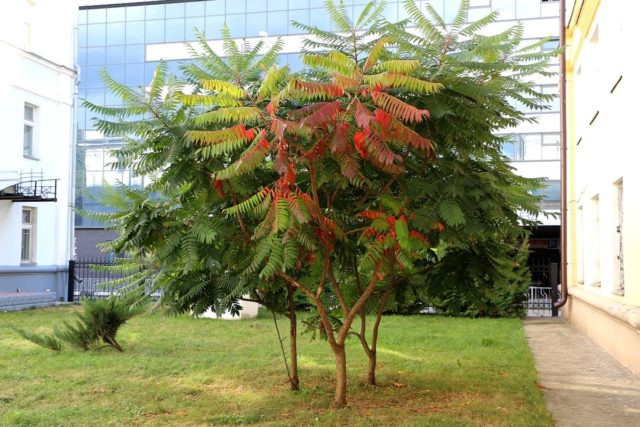
The forests of the Crimea and the Caucasus are considered the birthplace of sumach. But it is also found in Africa, European countries, Asia and North America. The shrub prefers rocky slopes and woodlands. He feels good in calm, sunny places.
Types of sumach
More than 250 plant species are represented in nature, but only a part of them is widespread. In gardening, deer-horned sumac is in the greatest demand. In Russia, the most common sumac is tannic. Poisonous varieties include rooting and eastern sumac.
What is the composition of sumac seasoning made of?
Sumac seasoning is especially popular in Muslim and Asian cuisines. It is used not only for flavoring but also as a colorant. The seasoning is made from crushed vinegar berries. They are pre-soaked in water and dried. 100 g of the resulting seasoning contains 239 kcal. Sumac includes the following substances:
- fatty acid;
- tannin;
- leucine;
- vitamins of groups H, B, C, PP and E;
- essential oils;
- wine acid;
- Apple acid;
- tannins;
- beta carotene;
- organic acids;
- lysine;
- amino acids.
Thanks to tannins, the seasoning has a pronounced antibacterial effect. In addition, these substances are able to remove toxins from the body and stop inflammation.The main benefit of fatty acids is to inhibit the development of pathogens. This helps to strengthen the body's defenses.
Tartaric acid speeds up metabolism and makes blood vessels more elastic. Malic acid, which sumac contains, ensures the normalization of peristalsis and promotes the removal of excess fluid from the body. Lysine improves the absorption of calcium and prevents the formation of cholesterol plaques in the vessels. Leucine, in turn, is involved in the formation of hemoglobin and slows down the aging process of cells.
The smell and taste of spice
Sumac seasoning has a pronounced sour taste with tart notes. Because of this, it is often used instead of lemon. In addition, it has a coloring effect. It is used to color food red. Sumac has a not pronounced, but pleasant aroma.
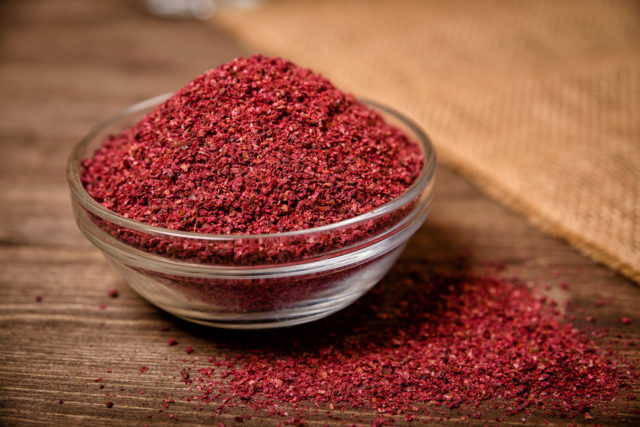
Why is sumac useful?
Sumakh gained immense popularity for a reason. Due to its rich content of acids and fatty oils, it has powerful antioxidant effects. In folk medicine, there are many recipes with its use. Sumakh does an excellent job with a breakdown and a decrease in immunity. It is often used to treat burns and throat. The beneficial properties of sumac seasoning include:
- antioxidant effect;
- removing excess fluid from the body;
- improving lactation during breastfeeding;
- normalization of intestinal microflora;
- acceleration of the healing process of burns, wounds and abrasions;
- anthelmintic properties;
- preventing the formation of malignant tumors;
- elimination of toxins, toxins and heavy metals from the body;
- lowering cholesterol levels;
- slowing down the aging process of cells;
- removal of inflammation.
Sumac is appreciated for its effective anti-inflammatory effect. Due to it, it is possible to cope with the inflammatory processes of the oral cavity, respiratory organs and the digestive system. The diuretic action allows you to eliminate puffiness and some diseases of the genitourinary system. When consumed regularly, the seasoning acts as an effective preventive measure against cardiovascular diseases. By lowering the level of harmful cholesterol in the blood, it prevents clogging of blood vessels by atherosclerotic plaques. This is especially important for the elderly and those who have bad habits.
Useful properties of sumach for men
The healing properties of the herb sumac are beneficial for the male body. The seasoning helps to replenish energy and strengthen the immune system. The anti-inflammatory effect makes it suitable for the treatment of prostatitis. But the treatment in this case should be comprehensive. Sumac is recommended to be used by men of mature age who have a predisposition to the development of arthrosis and arthritis. Also, the seasoning is very useful for diabetic patients.
The use of sumac seasoning in medicine
The medicinal properties of sumach are widely used in medicine. It can be found in Flakumin, Novikov's liquid, medicinal tannin and neo-anuzole. In folk medicine, sumy is used to make medicinal teas, ointments and tinctures. They can be used for both therapeutic and prophylactic purposes. Indications for the use of the remedy:
- indigestion;
- hypoglycemia;
- colds;
- diseases of the cardiovascular system;
- diabetes;
- fatigue syndrome;
- purulent wounds and burns;
- cholecystitis;
- gout;
- avitaminosis;
- cystitis;
- diseases of the throat and mouth.
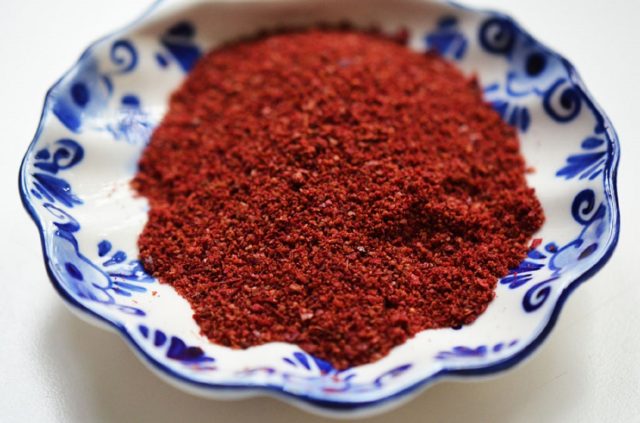
Sometimes sumac is used to stop vomiting and normalize appetite. According to statistics, he copes well with colds accompanied by chills. To do this, dissolve the seasoning by placing ¼ tsp under the tongue. There is also an opinion that sumac can be used to prepare antiseptic liquids intended for the treatment of skin wounds and abrasions.
Due to the content of gallic acid methyl ester, sumac copes with the reproduction of pathogenic microorganisms. It is most effective against Salmonella. The seasoning is often used to treat helminthic infestations.
With the help of seasoning, you can cope with attacks of cystitis. For these purposes, a medicinal infusion is used. ½ tsp seasonings pour 1 tbsp. water. The resulting drink is drunk in large quantities until the symptoms disappear completely. Such an infusion is advised to be taken to improve appetite and improve performance. The rich content of vitamins in its composition has a positive effect on the functioning of the immune system.
Application in cosmetology
Those who decide to use it for cosmetic purposes should familiarize themselves with the benefits and harms of sumac seasoning for human health. The seasoning is often used to make homemade face masks. It has a powerful antioxidant effect and accelerates the regeneration process. Due to this, aging is inhibited and skin rashes are eliminated. Experts recommend sumac for dermatitis, acne and seborrhea.
It is noteworthy that a positive effect on the epidermis is also obtained with the internal use of the seasoning. It replenishes the supply of vitamins in the body, thereby eliminating increased dryness and microcracks. In addition, it enhances the defense mechanisms of the epidermis. In the presence of skin diseases, use a spice ointment. It stops inflammation and promotes faster healing. With the help of seasoning, you can dye your hair in a pleasant shade with a copper tint. At the same time, it will strengthen the hair follicles and improve the condition of the hair.
Cooking applications
Sumac is considered one of the most versatile spices. It can be used everywhere in cooking. It will not spoil the dish, even when conducting culinary experiments. In Turkey and Iran, sumac is added to almost all rice dishes. In Syria, it is customary to combine it with meat and vegetables. You can also often find a seasoning in a marinade intended for fish or poultry. Sumac is often used in the manufacture of sauces. It pairs well with sesame seeds, cumin, coriander, thyme, and nutmeg.
Many gourmets prefer adding sumac to sandwiches, pâtés, and bean soup. It goes well with potatoes, meat, vegetables and any herbs. Sumac can be found in multicomponent seasonings. For example, it is considered the most important ingredient in Svan salt. Sumac is usually added a few minutes before the dishes are ready. It can be used wherever lemon juice is needed. Seasoning is a great alternative. On an industrial scale, sumac is often used in the manufacture of various canned food and pates.
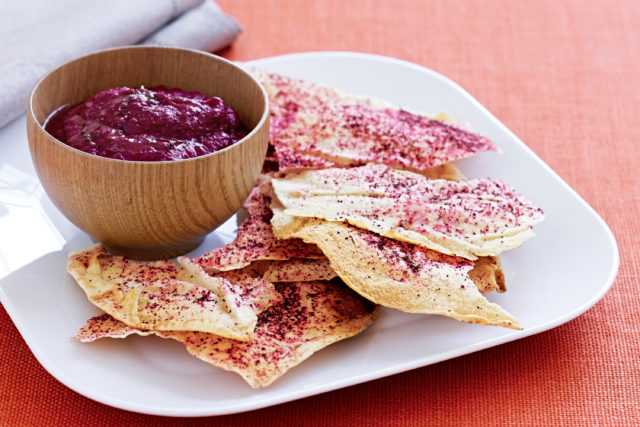
Contraindications and possible harm
Despite the long list of useful properties, sumac seasoning also has contraindications. They must be taken into account in order to prevent the development of allergies and other unpleasant side effects. Seasoning contraindications include:
- violation of blood clotting;
- pregnancy;
- violation of carbohydrate metabolism;
- peptic ulcer;
- disruption of the liver and kidneys;
- chronic gastritis.
If you use sumac for problems with the work of the gastrointestinal tract, you may encounter pain in the abdomen. They are caused by an exacerbation of a chronic disease. Sometimes sumac provokes an allergic reaction. The likelihood of its occurrence increases in case of intolerance to other spices. Allergy is accompanied by skin rash, itching and redness of mucous surfaces. Respiratory dysfunction is sometimes observed. When consumed in excessive amounts, the seasoning can lead to dizziness and general weakness of the body. There is also the possibility of worsening blood clotting.
How to choose and where to store
You can make the seasoning yourself or buy it ready-made. The beneficial properties in both cases will be the same. When buying, it is advisable to pay attention to fresh seasoning. The release date of sumac can be found on the packaging. If the seasoning is sold by weight, you need to pay attention to its appearance. Too intense a color indicates the presence of impurities. Sumac should have a sour smell, reminiscent of dry fruits. When rubbing the powder, grains may be felt in the hands. They are ground bones. They should not be in a quality seasoning. Sometimes counterfeit sumy is found in the markets. Most often, it is made from ground pomegranate rind, after which it is painted with a bright dye. Sumac should taste sour and slightly salty.
The seasoning should be stored in a glass or ceramic container with a tight lid. Protect it from direct exposure to sun and moisture. The most suitable storage space would be a kitchen cabinet. If all the conditions are met, the sum will retain its benefits for 1 year. After the specified time, the seasoning loses its taste and useful properties. Therefore, it is advisable to stock up on a small amount of seasoning. The longer it is stored, the less intense its flavor will be.
Conclusion
The useful properties of sumach cannot be exaggerated. Seasoning not only has a positive effect on health, but also easily replaces salt. In addition, its presence in the diet significantly reduces the risk of developing dangerous diseases.

